|
|
|
Sort Order |
|
|
|
Items / Page
|
|
|
|
|
|
|
| Srl | Item |
| 1 |
ID:
175128
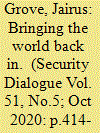

|
|
|
|
|
| Summary/Abstract |
Quantum physics is being positioned as a new archive for addressing major theoretical problems in the field of international relations. Two of the major proponents of engaging quantum thinking within international relations, James Der Derian and Alexander Wendt, have argued that quantum thinking offers the possibility of a major paradigm shift in the field. Before we determine quantum’s revolutionary potential, the persistent and most pressing question for me is how to position quantum thinking among other kinds of and claims to knowledge. I want to horizontalize where different kinds of knowledge sit within the renewed attention to quantum theory. Rather than just horizontalize or flatten ontology, I want to see what happens when we place scientific and philosophical inquiry in dialogue, and what that conversation does to the authority and value of quantum thinking for the social sciences. The article reconstructs the dialogue between the first generation of quantum physicists and the philosophers who informed them. Rather than make an explicit argument about the philosophical debt of physics, I argue that a broad and highly interdisciplinary set of questions drove both fields well beyond the specific areas of expertise of any of these thinkers. I believe this adventure of ideas followed by physicists, philosophers, and social theorists alike offers us a way forward as the complexity of our contemporary global challenges confront us now with the necessity to think well beyond our disciplinary expertise.
|
|
|
|
|
|
|
|
|
|
|
|
|
|
|
|
| 2 |
ID:
175131
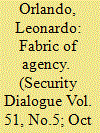

|
|
|
|
|
| Summary/Abstract |
Building on new trends in neuroscience and philosophy of mind, this article provides a roadmap for incorporating consciousness into social research. Drawing upon Alexander Wendt’s Quantum Mind and Social Science, it is argued that one of the greatest obstacles encountered by social research when approaching social reality is that it provides neither an epistemological nor an ontological place for consciousness. The present article intends to address that problem by introducing a sophisticated method of guided introspection that has the potential to revolutionize our understanding of agency. This method, whose epistemological situation is isomorphic to that of quantum physics, enables researchers to gain insight into the structures of decisionmaking processes. Such an endeavor is extremely relevant for security studies: the consideration of consciousness could lead to a radical new understanding of the dynamics of conflict, cooperation, strategic defense, political polarization, radicalization, violent extremism, and terrorism, as well as of the processes of social transformation required to cope with climate change. Moreover, bringing consciousness into social research could foster ongoing biological, evolutionary, and neuroscientific approaches to international relations. Thus, through the introduction of the ‘phenomenal consciousness’ of actors, it is shown how we can dive into the fountainhead of human agency and map mental processes.
|
|
|
|
|
|
|
|
|
|
|
|
|
|
|
|
| 3 |
ID:
175127
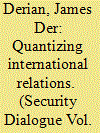

|
|
|
|
|
| Summary/Abstract |
This special issue is conceived out of the proposition that recent developments in quantum theory as well as innovations in quantum technology have profound implications for international relations, especially in the field of international security. Interaction with quantum theory outside the circle of physics has been limited; our goal is to catalyse an informed debate on the virtues of quantum theory for international relations. As new scientific discoveries and technological applications suggest large-scale quantum phenomena, near-simultaneous interconnectivity creates global entanglements, and ubiquitous media produce profound observer-effects, we wish to make of quantum theory a human science. With the arrival of quantum computing, communications and artificial intelligence, we can also expect to see significant transformations in the nature, production and distribution of power and knowledge. This special issue introduces quantum approaches that can help us better understand, anticipate and perhaps even ameliorate the most pressing global issues facing us today and in the near future.
|
|
|
|
|
|
|
|
|
|
|
|
|
|
|
|
| 4 |
ID:
175129
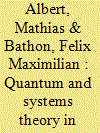

|
|
|
|
|
| Summary/Abstract |
This article provides a sympathetic, yet also somewhat critical, engagement with the notion of ‘quantizing’ by exploring substantive overlaps between quantum and systems theory. It is based on the observation that while quantum theory is ‘non-classical’ in its entire world-view, there is a danger that when it comes to the social world it is simply laid on a world-view of that world, which remains at its core ‘classical’. This situation calls for engaging quantum with existing non-classical social theories. Resemblances between quantum and systems theory are obviously given through similarities around the concepts of observation and meaning, whose status and function in both bodies of theory is explored. We then probe the degree to which obvious analogies in fact could be read as overlaps and similarities that could be put to complementary analytical use: in a sense, we argue that systems theory ‘does’ quantum theory, and vice versa. The article concludes with some vistas of this discussion for the field of international relations.
|
|
|
|
|
|
|
|
|
|
|
|
|
|
|
|
| 5 |
ID:
175133
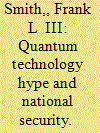

|
|
|
|
|
| Summary/Abstract |
Technology hype is an important concept in business, marketing, and science and technology studies, but it is rarely related to security studies. What is technology hype? How does it relate to national security? And to what effect? This article examines rational and performative perspectives on technology hype as either a kind of exaggeration or expectant discourse. Adopting the latter view, I compare and contrast hype cycles with threat inflation and securitization theory. I then sketch my own theoretical propositions about technology hype as being common in national security, with variable degrees of acceptance, familiar content, and significant consequences. A case study on quantum technologies provides proof of concept. I find ample evidence of hype over quantum computers, communications, and sensors; audience acceptance in the national security community varies with familiarity; and consequential decisions appear to follow. While cyclical expectations suggest the need for caution when citing quantum technologies in support of quantum approaches to international relations, a middle-range theory about technology hype provides useful insight into security practice.
|
|
|
|
|
|
|
|
|
|
|
|
|
|
|
|
| 6 |
ID:
175130


|
|
|
|
|
| Summary/Abstract |
This article seeks to explore the quantum notion that to ‘see’ an entanglement is to break it in the context of an ‘experiment’ regarding the ongoing impact of traumatic political memory on the present. The analysis is a product of collaboration over the past four years between the two authors, one a scholar of international relations, the other a therapeutic practitioner with training in medical physics. Our focus is the conceptual claim that ‘seeing’ breaks an entanglement rather than the experiment itself. The first section explores a broad contrast between classical and quantum measurement, asking what this might mean at the macroscopic level. The second section categorizes Wendt’s claim about language as a form of expressive measurement and explores the relationship to discourse analysis. The third section explores the broad contours of our experiment and the role of a somewhat different form of non-linear expressive measurement. In the final section, we elaborate the relationship between redemptive measurement and breaking an entanglement, which involves a form of ‘seeing’ that witnesses to unacknowledged past trauma.
|
|
|
|
|
|
|
|
|
|
|
|
|
|
|
|
| 7 |
ID:
175132
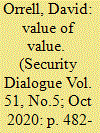

|
|
|
|
|
| Summary/Abstract |
Money objects, from coins to bitcoins, are used in economic exchange as a way of putting a number on the fuzzy concept of worth or value. They are inherently dualistic in that they combine the properties of abstract numbers with the properties of owned objects. As a result of this duality at its core, the money system exhibits the properties of a macroscopic quantum system, including entanglement, indeterminacy and interference, with money objects playing a special role as a measurement device. This article argues that, by virtue of its dualistic nature, money acts as a vector of transmission that scales up the properties of quantum mind to the global level. By bringing money back into the picture and providing an alternative to the mechanistic vision of mainstream economics, quantum social science promises to change the way we see and treat the economy, with implications for international relations and security.
|
|
|
|
|
|
|
|
|
|
|
|
|
|
|
|
|
|
|
|
|